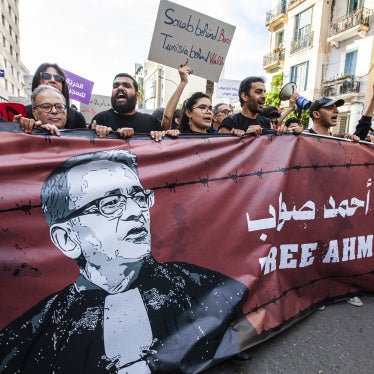In a letter to President Zine el-Abidine Ben Ali today, Human Rights Watch criticized recent measures intended to stifle independent human rights activity in Tunisia, including the one-year prison sentence imposed on December 30 on Dr. Moncef Marzouki.
Marzouki, a professor of medicine and veteran human rights activist, was convicted on the basis of statements he signed as spokesman of the National Council on Liberties in Tunisia (CNLT), a rights group that the authorities have refused to recognize. Human Rights Watch also criticized the questioning yesterday of Slaheddine Jourchi, a vice-president of the Tunisian Human Rights League, by an investigating magistrate, and the recent imprisonment of another CNLT member, lawyer Nejib Hosni.
A copy of the letter is below.
***
3 January 2001
President Zine al-Abidine Ben Ali
Preident de la Republique
Palais Preidentiel
Tunis
Tunisia
Your Excellency,
We are writing to protest the conviction of Moncef Marzouki, spokesperson of the National Council on Liberties in Tunisia (CNLT), and other recent measures that are aimed at stifling independent human rights activity in your country.
On December 30, the Court of First Instance in Tunis sentenced Dr. Marzouki to one year in prison on charges of "belonging to an illegal association" (in this case the internationally respected CNLT) and "disseminating false news with the intent of disturbing the public order." The basis for this conviction is CNLT communiqu? deploring human rights conditions in Tunisia that were signed by Dr. Marzouki. The interior ministry refused the CNLT's application for legal recognition in 1999. Dr. Marzouki, who was imprisoned in 1994 for his political beliefs, is free pending a decision on whether to appeal. In July, the Ministry of Health arbitrarily fired him from his teaching post at the University of Sousse Faculty of Medicine. He is reportedly being followed by plainclothes police wherever he goes.
In our view, the charges for which Dr. Marzouki faces a term in prison contradict Tunisia's obligations under international law to uphold the rights to freedom of association and of expression. Regrettably, they have been used during your presidential tenure to imprison many peaceful human rights defenders and political dissidents.
In another disturbing development, we have received reports that CNLT member and human rights lawyer Mr. Nejib Hosni was transferred to a prison in Gabes, far from his home and family in Le Kef, only days before the date of his expected release from prison. Mr. Hosni was jailed on December 21 after receiving a fifteen-day sentence on dubious charges of "illegally" practicing the legal profession. The Bar Council of Tunisia (Conseil National de l'Ordre des Avocats Tunisiens) took part in his defence.
We also note that yesterday, an investigating judge in Tunis questioned Mr. Slaheddine Jourchi, a vice president of the Tunisian Human Rights League (LTDH), on possible charges of "disseminating false news with the intent of disturbing the public order." The judicial investigation apparently stems from a December 11 LTDH communique signed by Mr. Jourchi about human rights issues.
Earlier in November, the activities of the LTDH were frozen and its offices shut by court order. This action was taken in response to a legal challenge to the LTDH internal elections in October that lead to a slate of independent-minded activists winning control of the league's steering committee. Mr. Jourchi, an incumbent vice-president, is on the victorious slate that is being challenged. Courts are to scheduled to examine aspects of that challenge on January 9 and 15.
The convictions of Moncef Marzouki and Nejib Hosni, and the investigation of Slaheddine Jourchi are in our view the latest evidence of a campaign on the part of your government to persecute human rights defenders as individuals and to cripple the independent organizations with which they are affiliated. We have written to you concerning previous incidents of harassment directed at human rights defenders, most recently on December 28, 2000.
We believe Mr. Hosni should be released from prison immediately and unconditionally. The politically motivated investigation of Mr. Jourchi should be dropped, and the convictions of both Mr. Hosni and Dr. Marzouki should be overturned. All three men should be allowed to exercise their rights to monitor and speak out on human rights issues without reprisal or prosecution, and to travel freely. Furthermore, we urge an end to the judicial and police harassment directed at the human rights organizations with which they are affiliated, so that these can continue to pursue freely their important work.
We thank you for your consideration and welcome your reply.
Sincerely yours,
/S/
Hanny Megally, Executive Director, Middle East and North Africa Division
cc: HE Hatem Atallah, Ambassador of Tunisia to the United States







